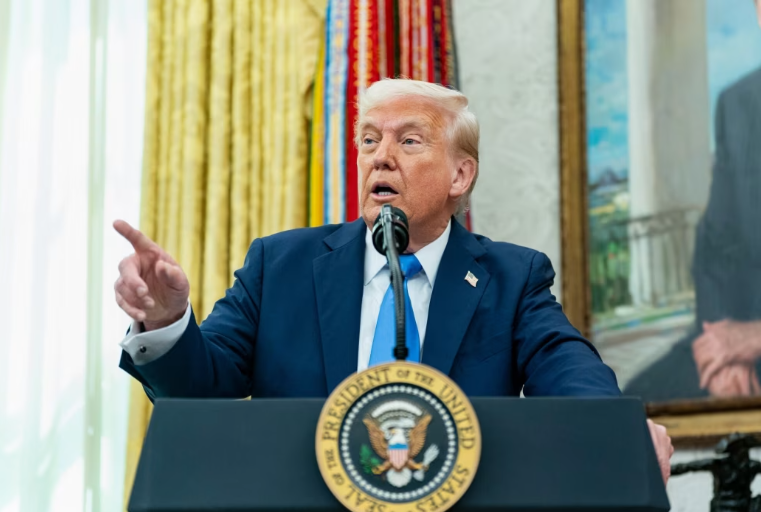(BBC News) Donald Trump has said he “couldn’t care less” if carmakers raise prices after his 25% tariffs on foreign-made vehicles come into effect.
Some analysts have warned that Trump’s import charges could lead to the temporary shutdown of some US car production, with increased prices passed on to consumers.
But the US president told NBC News on Saturday that he hoped foreign carmakers will raise prices as it meant “people are gonna buy American-made cars – we have plenty.”
On Wednesday, Trump announced new 25% tariffs on cars and car parts entering the US to begin on April 2. Charges on businesses importing vehicles are expected on April 3, and taxes on parts are set to start in May or later.
When asked about what his message was to car bosses, he said: “The message is congratulations. If you make your car in the United States, you’re going to make a lot of money.”
He continued: “If you don’t, you’re going to have to probably come to the United States, because if you make your car in the United States, there is no tariff.”
Recent polling by CBS News suggests that consumers are worried the tariffs will raise prices, with 72% indicating that they believe costs will increase in the short-term. More than half of respondents said the Trump administration is not focusing enough on lowering costs for Americans.
Asked about this sentiment on Sunday, Trump’s senior counsellor for trade and manufacturing Peter Navarro asked people to put their trust in the US president.
“Trust in Trump,” Navarro told Fox News, adding that previous tariffs on China by the US have led to “prosperity and price stability.”
“The reason why we will not see inflation is because foreigners are going to eat most of it, they have to,” he said, adding that the US “is the biggest market in the world.”
Shawn Fain, the leader of union United Auto Workers, criticised Trump for his labour and immigration policies on CBS Face the Nation – but he said tariffs were a necessary “tool in the toolbox” to return manufacturing to the US.
“There is plenty of opportunity. And I have had companies tell us, point blank, that they are going to have to bring product back here if those tariffs are implemented.”
The 25% import tax on carmakers was briefly implemented but paused at the beginning of March, following pleas from major North American manufacturers including Ford, General Motors and Stellantis.
But Trump told NBC that he did not plan to delay the tariffs on cars any longer, saying he would consider negotiating “only if people are willing to give us something of great value – because countries have things of great value, otherwise, there is no room for negotiation.”
In another interview with NBC News on Sunday, he threatened to impose secondary tariffs of 25-50% on Russian oil if he feels Vladimir Putin is stalling progress on Ukraine peace talks.
“If Russia and I are unable to make a deal on stopping the bloodshed in Ukraine, and if I think it was Russia’s fault – which it might not be – but if I think it was Russia’s fault, I am going to put secondary tariffs on oil, on all oil coming out of Russia,” he told the outlet.
“There will be a 25% tariff on oil and other products sold in the United States, secondary tariffs,” Trump said, adding that tariffs on Russia would come within a month without a ceasefire deal.
Trump said Putin knows he is angry, but that he has “a very good relationship” with the Russian president.
He went on to say that “the anger dissipates quickly” but only if Putin “does the right thing”.
Trump said he will speak to Putin again this week.
Analysts say the upcoming tariffs that Trump has planned could further strain relations with some of the US’s main trading partners.
Trump’s comments come as Downing Street sources said the UK would not hesitate to retaliate against US tariffs if needed.
The UK is in last-minute negotiations with the White House and is trying to get an exemption, arguing that – unlike other countries – the UK has a relatively equal trading relationship with the US. Prime Minister Sir Keir Starmer has said he does not want to jump into a trade war.
Several major economies have vowed to retaliate in response to Trump’s tariffs.
Germany has said it “will not give in” and that Europe must “respond firmly”, while France’s president branded the move “a waste of time” and “incoherent”.
Canada has called it a “direct attack”, and China accused Washington of violating international trade rules.


